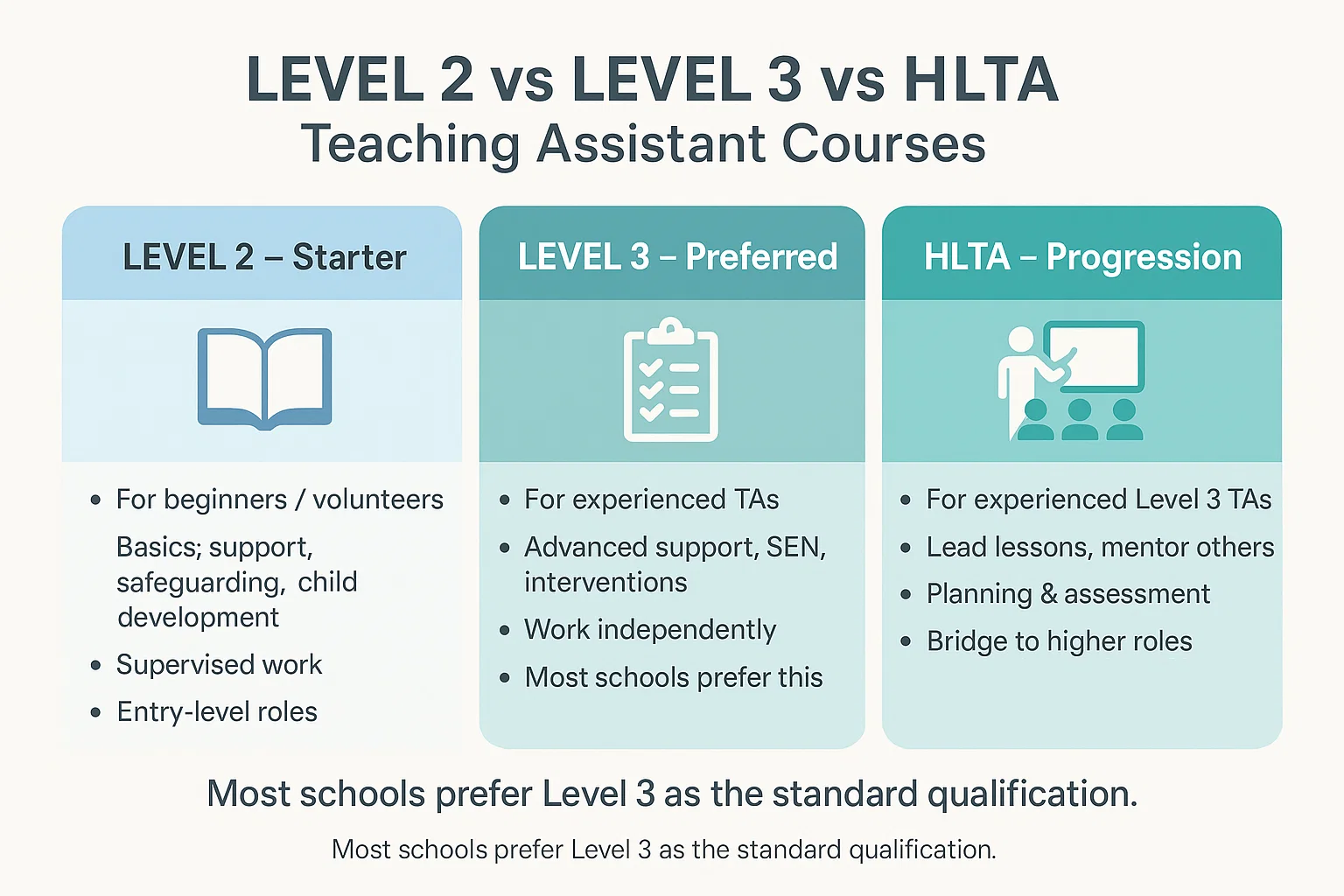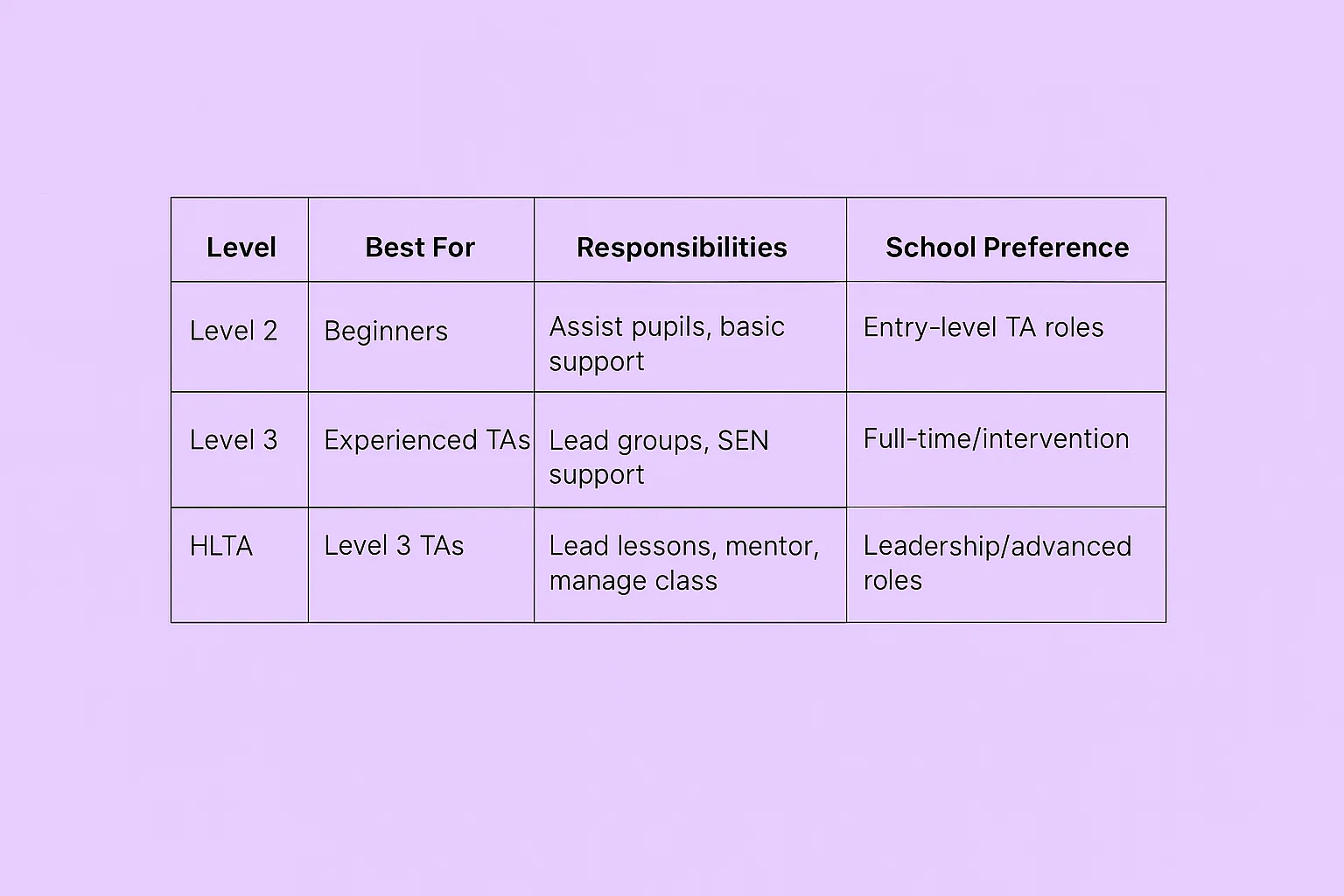No products in the cart.
Here’s the real talk — there’s no single national licence that says, “You’re officially a Teaching Assistant now!” But that doesn’t mean anyone can just walk into the job. Most schools in the UK want you to have GCSEs in English and Maths (grades 9–4 or C and above) or an equivalent qualification. You’ll also need a clean DBS check and, just as important, the right attitude for working with children — patience, empathy, and genuine care. So, if you’re wondering “Do I need qualifications to be a teaching assistant?” — the short answer is yes, but it’s more about being school-ready than ticking endless boxes.
In this blog, we will break down what schools really look for and how you can start your journey toward becoming a teaching assistant in the UK.
Do I Need Qualifications to Be a Teaching Assistant in the UK?

Not really! If you’re thinking about becoming a teaching assistant, good news — you don’t need a fancy degree or years of training to start. But there are a few key boxes you’ll need to tick before schools will hire you. Here’s a simple breakdown of what you’ll need and why it matters:
1. GCSEs in English and Maths (Grades 9–4 / C or Above)
Most schools ask for at least GCSEs in English and Maths. These show you’ve got the basic skills to help pupils with reading, writing, and number work. If you don’t have GCSEs, you can usually show an equivalent qualification, like Functional Skills Level 2. Some schools might even let you train while you work, as long as you’re willing to get those qualifications soon.
2. A Clear Enhanced DBS Check
This is one of the most important parts. A Disclosure and Barring Service (DBS) check proves you have no criminal record that would stop you from working with children. Schools usually arrange this before you start. It’s a legal must-have for anyone working in education or childcare.
3. The Right to Work in the UK
Whether you’re from the UK or abroad, you need to show proof that you can legally work here. This could be a UK passport, a visa, or a settled/pre-settled status under the EU Settlement Scheme. Without this, schools simply can’t employ you.
4. References and Character Checks
Schools always ask for at least two references — one from a past employer, or if you’re new to work, from a teacher, tutor, or volunteer supervisor. They’re checking that you’re reliable, responsible, and safe to be around children. Some schools also do a short interview or trial day to see how you interact with pupils.
5. Basic Safeguarding Awareness
Safeguarding is all about keeping children safe — physically and emotionally. Even before you start, schools expect you to have at least a basic understanding of safeguarding and child protection. Many short online courses cover this, and they look great on your CV. Once you’re hired, you’ll get proper in-school training on spotting risks and reporting concerns.
6. Soft Skills That Really Matter
While not a “qualification,” your personality is just as important as your certificates. Schools look for people who are kind, calm under pressure, and patient with children. Good communication, teamwork, and a genuine passion for helping pupils grow can make all the difference.
Can I Become a Teaching Assi,stant Without Any Qualifications?

Yes — you absolutely can start your journey as a teaching assistant even without formal qualifications or experience. Many people do! Schools understand that everyone has to start somewhere, so they often offer entry-level or apprenticeship roles for those who are new to education. What matters most is your attitude, your willingness to learn, and how you connect with children.
1. Start with Volunteering or Work Experience
If you’ve never worked in a school before, volunteering is a great first step. Many primary and nursery schools welcome helpers for reading sessions, classroom activities, or playground duties. This hands-on experience gives you a real feel for school life and helps you build confidence. It also looks great on your CV and can lead directly to a paid position later on.
You can ask local schools if they accept volunteers or check your council’s website for opportunities. Even a few hours a week can make a big difference.
2. Look for TA Apprenticeships
Apprenticeships are one of the best routes if you don’t have qualifications yet. They let you earn while you learn, working in a school and completing a Level 2 or Level 3 Teaching Assistant course at the same time. You’ll get training, mentoring, and real classroom experience — all while being paid.
Apprenticeships usually take 12–18 months and don’t require prior experience, just enthusiasm and basic literacy and numeracy skills. You can find vacancies on the UK Government Apprenticeship website or through local training providers.
3. Show Strong References and Character
Even if you haven’t worked in a school, you can still provide character references from a teacher, employer, or community leader — someone who can vouch for your reliability and your ability to work with children. Schools care about trust and behaviour just as much as certificates.
If you’ve ever done babysitting, youth work, tutoring, or community volunteering, that counts as child-facing experience too — be sure to mention it!
4. Get Basic Safeguarding Training
One small but powerful step is taking a basic safeguarding course online. These short courses teach you how to keep children safe and are often recognised by schools. It shows employers that you take your role seriously and understand the basics of child protection. Some schools or training providers even include safeguarding as part of their induction if you start as a volunteer or apprentice.
Want to take the next step?
Check out our courses designed for future teaching assistants:
- Level 2 Safeguarding Children Training Course – a great starting point to build essential safeguarding knowledge.
- Level 3 Designated Safeguarding Lead Training Course – perfect if you’re aiming for more responsibility in a school setting.
These recognised qualifications will not only boost your CV but also give you the confidence to support pupils safely from day one.
5. Build the Right Skills and Attitude
If you’re kind, patient, organised, and good at listening — you already have the foundation of a great teaching assistant. Schools can train you in the rest. Show that you’re eager to learn, enjoy helping others, and can handle responsibility. Those qualities go a long way.
Which Qualifications Help Me Get a Teaching Assistant Job?
If you really want to stand out when applying for teaching assistant jobs, the right qualifications can make a big difference. While you can start in entry-level roles with just basic requirements, having recognised training under your belt shows schools you’re serious about the job — and ready to support pupils with confidence.
Here’s a breakdown of the qualifications that can help you get started (and move up) as a teaching assistant in the UK:
1. Level 2 Certificate in Supporting Teaching and Learning
This is the perfect starting point if you’re new to education. The Level 2 Award in Support Work in Schools and Colleges from Open Lead teaches you the basics of classroom support — from helping pupils with their work to keeping them safe and engaged. You’ll learn how to communicate with teachers, handle behaviour, and assist with learning activities.
It’s ideal for classroom assistants or those working with small groups under supervision. You can study this qualification online or through a local college while volunteering or working part-time in a school.
2. Level 3 Certificate or Diploma in Supporting Teaching and Learning
If you already have some school experience or want to take the next step, the Level 3 qualification is the way to go. This course focuses on more advanced classroom responsibilities — like planning learning activities, supporting children with special educational needs, and working independently with small groups.
Many employers see Level 3 as the standard for full-time teaching assistant roles. You can complete it through a training provider, college, or flexible online course, often while working in a school.
3. Level 3 Teaching Assistant Apprenticeship
Want to earn while you learn? The Level 3 Teaching Assistant Apprenticeship gives you real classroom experience while studying. You’ll work alongside qualified teachers, gain practical skills, and complete coursework as you go.
Apprenticeships usually take about 18 months and are perfect for those without prior qualifications. You’ll finish with both a national qualification and valuable on-the-job experience — a strong combo that schools love.
4. Short CPD Courses to Boost Your Skills
In addition to main qualifications, short CPD (Continuing Professional Development) courses help you build specialist knowledge and make your CV stand out. Popular CPD courses for teaching assistants include:
- Safeguarding and Child Protection – understand how to keep children safe.
- Paediatric First Aid Course – be ready for emergencies.
- Phonics and Literacy Support – great for working in primary settings.
- Autism Awareness and ADHD Support – learn how to help pupils with additional needs.
- Behaviour Management – handle tricky classroom moments with confidence.
These short courses show initiative and can help you move toward higher-level roles, like SEN (Special Educational Needs) support or classroom leadership.
Do Schools Prefer Level 2 or Level 3 Teaching Assistant Courses?

Choosing the right teaching assistant qualification can affect the roles you’re eligible for and the responsibilities you can take on in a school. Here’s a detailed look at the differences between Level 2, Level 3, and Higher Level Teaching Assistant (HLTA) courses, and what schools usually prefer.
1. Level 2 Teaching Assistant: The Starter Course
Who it’s for: Newcomers to the teaching assistant role, volunteers, or anyone with little to no classroom experience.
What it covers:
- Basics of supporting classroom activities and learning.
- Assisting teachers with individual pupils or small groups.
- Understanding safeguarding, behaviour management, and basic child development.
- Communication and teamwork skills for classroom settings.
Why schools offer it:
- Suitable for entry-level positions.
- You’ll usually work under supervision and support teachers rather than leading sessions.
- Can be combined with volunteering or part-time work to gain practical experience.
Outcome:
- Level 2 TAs are competent in supporting pupils but are generally not expected to lead interventions or work independently.
2. Level 3 Teaching Assistant: The Preferred Choice
Who it’s for: Those with some experience in schools or who want to take on more responsibility.
What it covers:
- Advanced classroom support and independent work with pupils.
- Planning and delivering small group interventions.
- Supporting pupils with special educational needs (SEN).
- More detailed safeguarding, behaviour management, and assessment skills.
- Working alongside teachers to help manage classroom activities effectively.
Why schools prefer it:
- Shows you can work independently without constant supervision.
- Enables you to support learning more proactively and lead small groups.
- Often required for full-time TA roles, SEN support, or positions involving intervention programmes.
Outcome:
- Level 3 TAs can take on extra responsibilities and are more competitive in the job market.
- Many schools view Level 3 as the standard qualification for serious TA candidates.
3. Higher Level Teaching Assistant (HLTA): Career Progression
Who it’s for: Experienced Level 3 TAs who want to advance in responsibility.
What it covers:
- Leading lessons or small classes under teacher guidance.
- Mentoring other TAs or new staff.
- Supporting planning and assessment of learning activities.
- Managing classroom behaviour and maintaining a safe learning environment.
Requirements:
- Significant classroom experience as a Level 3 TA.
- Completion of HLTA assessment and training.
- Schools may require evidence of leadership, planning, and independent teaching skills.
Outcome:
- HLTAs can take on teaching responsibilities and are often seen as the bridge to higher roles in education, such as SEN support, lead TA, or teaching pathways.
4. Choosing the Right Level for You
- Level 2: Ideal if you’re just starting, volunteering, or working part-time. It builds confidence and core skills.
- Level 3: Opens doors to full-time roles, SEN support, interventions, and independent classroom work.
- HLTA: Aimed at experienced TAs ready to take leadership responsibilities and expand their career path.
5. Quick Comparison Table

|
Level |
Best For |
Responsibilities |
School Preference |
|
Level 2 |
Beginners |
Assist pupils, basic support |
Entry-level TA roles |
|
Level 3 |
Experienced TAs |
Lead groups, SEN support |
Full-time/intervention |
|
HLTA |
Level 3 TAs |
Lead lessons, mentor, manage class |
Leadership/advanced roles |
Do I Need GCSEs to Be a Teaching Assistant in England?
If you’re wondering “Do I need qualifications to be a teaching assistant?”, the short answer is: most schools expect at least GCSEs in English and Maths (grades 9–4 or C and above). These qualifications show you have the basic skills to support learning, help with literacy and numeracy tasks, and communicate effectively with pupils and teachers.
What if I Don’t Have GCSEs?
Don’t worry — not having GCSEs doesn’t automatically rule you out. Many schools accept Functional Skills Level 2 in English and Maths as an equivalent. These courses cover the same essential skills in a practical way and are often mentioned in job adverts for teaching assistants.
Functional Skills are a great option if you’re returning to education, switching careers, or looking to qualify while gaining experience in a school.
Why Schools Ask for These Qualifications
- Ensures you can support pupils with reading, writing, and number work.
- Demonstrates basic communication and problem-solving skills.
- Gives confidence that you can follow lesson plans and help with classroom tasks accurately.
In Short:
- GCSEs in English and Maths (9–4/C) are the usual baseline for teaching assistant roles.
- Functional Skills Level 2 can be an acceptable alternative if you don’t have GCSEs.
Having these qualifications isn’t about being “overqualified” — it’s about being ready to step into the classroom and support learning effectively. Schools need TAs they can trust to help pupils confidently and safely.
How Do Online Teaching Assistant Courses Work?
Online teaching assistant courses are designed to make training flexible and easy, especially if you’re working or volunteering while learning. Here’s how they usually work:
1. Learn Through Online Modules
Most courses are split into modules covering topics like classroom support, child development, safeguarding, and behaviour management. You can study these modules at your own pace from home, using videos, reading materials, and quizzes.
2. Submit Assignments
After completing each module, you’ll usually need to submit assignments to show what you’ve learned. These might be short reports, reflections, or practical tasks based on classroom scenarios. Your tutor will mark them and give feedback to help you improve.
3. Practical School Experience (Sometimes Required)
Some courses, especially Level 3 or apprenticeships, ask for school placement hours or a mentor’s sign-off. This ensures you get hands-on experience in a real classroom, supporting pupils and practising what you’ve learned online.
Even if placements aren’t mandatory, many online providers encourage volunteering or shadowing in a school to build experience.
4. Choose Accredited Providers
When choosing training, always pick accredited Level 2 or Level 3 providers. Accredited courses are recognised by schools and employers, so your qualification counts when you apply for jobs. Non-accredited options may build knowledge, but they lack the same career value. That’s why Open Learning Academy is a smart choice.
Their Teaching Assistant Course is fully accredited, flexible, and affordable, giving you the right credentials to stand out and succeed in education.
What Qualifications Do I Need to Work with SEN Pupils?

Working with SEN (Special Educational Needs) pupils is rewarding, but it requires a mix of formal qualifications, specialist training, and personal skills. Schools want teaching assistants who are prepared, knowledgeable, and able to support children safely and effectively.
1. Baseline Requirements
- You need GCSEs in English and Maths (grades 9–4 / C and above) or equivalent Functional Skills Level 2 qualifications to demonstrate basic literacy and numeracy skills.
- A clear enhanced DBS check is essential to confirm that you are suitable to work with children.
- You must have the right to work in the UK to be legally employed in a school.
- Basic safeguarding awareness is required to ensure you understand how to protect children from harm and follow school policies.
2. Specialist SEN Training
- Completing training in Autism and ADHD awareness helps you understand different learning styles, behaviours, and how to support pupils with additional needs.
- Learning communication systems like Makaton or PECS (Picture Exchange Communication System) allows you to help non-verbal or minimally verbal pupils communicate effectively in class.
- Team-Teach or behaviour management training equips you with strategies to handle challenging behaviour safely and maintain a positive classroom environment.
- Paediatric First Aid, especially for Early Years Foundation Stage (EYFS) pupils, prepares you to respond appropriately to injuries or medical emergencies.
3. Formal Teaching Assistant Qualifications
- The Level 2 Supporting Teaching and Learning course is ideal for beginners and covers core skills such as assisting pupils, supporting classroom activities, and following teachers’ instructions.
- The Level 3 Supporting Teaching and Learning course is preferred for those who want to work independently, deliver small group interventions, and support pupils with SEN more effectively.
- For experienced teaching assistants, the Higher Level Teaching Assistant (HLTA) qualification with a SEN focus allows you to take on advanced responsibilities, including planning lessons, leading small groups, and mentoring other TAs.
4. Soft Skills and Personal Qualities
- Patience and empathy are essential when supporting pupils with additional needs.
- You need to be observant and attentive to pupils’ behaviour and learning patterns.
- Following Individual Education Plans (IEPs) and behaviour support plans carefully is crucial to providing consistent support.
- Flexibility, calmness under pressure, and clear communication with pupils, teachers, and parents are highly valued by schools.
Do Qualifications Affect Teaching Assistant Pay and Progression?
Yes, your qualifications can directly affect both your pay and your career progression as a teaching assistant. Schools and local authorities recognise higher-level qualifications because they indicate that you can take on more responsibility and work more independently.
Completing a Level 3 Supporting Teaching and Learning course usually places you on a higher local authority pay grade (NJC grade) than a Level 2 teaching assistant. This often means a better hourly rate and improved overall salary. Similarly, becoming a Higher Level Teaching Assistant (HLTA) typically positions you even higher on the NJC scale, reflecting your ability to manage advanced duties such as leading small group interventions or covering lessons in the teacher’s absence.
Higher qualifications also open doors to greater responsibilities within schools. Level 3 and HLTA TAs are often trusted to support pupils independently, run interventions, and mentor other teaching assistants. These qualifications can also make you eligible for specialist roles, such as working with SEN pupils or supporting literacy and numeracy programs. Over time, advancing your qualifications can lead to more permanent contracts, senior support positions, and improved pay, making it a clear way to progress in your teaching assistant career.
Final Thoughts
Becoming a teaching assistant in the UK is a rewarding career that doesn’t always require years of experience or a long list of qualifications to get started. Most schools expect baseline requirements like GCSEs in English and Maths, a clear DBS, and basic safeguarding awareness. Beyond that, your qualifications, training, and personal skills can shape your opportunities, pay, and career progression.
Entry-level roles and apprenticeships allow you to start gaining experience even without formal qualifications, while Level 2 and Level 3 courses help you develop the skills to work more independently and take on advanced responsibilities. Specialist training, such as Autism or ADHD awareness, Makaton, PECS, behaviour management, and paediatric first aid, equips you to support SEN pupils effectively. Over time, progressing to HLTA or leadership roles can increase both your impact in the classroom and your pay.
Ultimately, being a successful teaching assistant isn’t just about certificates—it’s about patience, empathy, and a genuine desire to help children learn and thrive. By combining the right qualifications, practical experience, and personal qualities, you can build a fulfilling career that makes a real difference in young lives.
At Open Learning Academy, our Teaching Assistant Course gives you the knowledge, confidence, and accredited qualification you need to succeed. Whether you’re new to education or aiming to progress to Level 3 or HLTA, this flexible online course fits around your life and helps you gain the skills schools value most.
FAQs about Becoming a Teaching Assistant
- Can I become a teaching assistant without qualifications?
Yes, some schools hire without formal qualifications, but having relevant training, experience, or NVQ/Level 2–3 certifications in education increases your chances significantly.
- How much do TAs get paid per hour?
Teaching assistants in the UK typically earn £11–£13 per hour, depending on region, experience, and school type.
- What qualifications are required to be a teaching assistant?
Commonly required: GCSEs in English/Maths and a Level 2 or 3 TA qualification. Some schools accept experience with children instead.
- How long does it take to train to be a TA?
Training usually takes 6 months to 1 year for Level 2–3 qualifications, depending on study pace and provider.
- What is a TA salary in the UK?
On average, £14,000–£21,000 annually for full-time roles, varying by region, school, and responsibilities.
- Is becoming a TA hard?
It can be challenging due to classroom demands, but rewarding for those who enjoy supporting children’s learning and development.
- Do you have to be clever to be a teaching assistant?
You don’t need to be academically gifted, but patience, communication skills, and adaptability are essential.
- What is the 10 minute rule in teaching?
It suggests students can focus for about 10 minutes per year of age—guiding lesson structuring and pacing.
- How many hours a day does a TA work?
Typically 6–7 hours daily, aligning with school hours, though part-time roles are also common.




